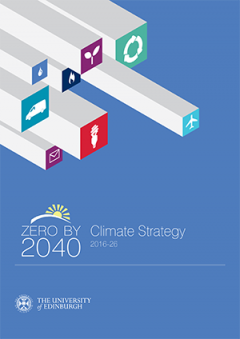Climate change
The University's new Climate Strategy lays out a comprehensive whole institution approach to climate change mitigation and adaptation to achieve an ambitious net zero carbon target.
Absolute carbon emissions
This chart shows the trend of the University’s emissions and includes emissions across both the academic estate and accommodation services.
The scope of this chart has been changed according to the revised Zero by 2040 climate strategy.
Absolute carbon emissions
This chart shows the trend of the University’s emissions and includes emissions across both the academic estate and accommodation services.
The scope of this chart has been changed according to the revised Zero by 2040 climate strategy.
| Scope 1 | Scope 2 | Scope 3 | |
|---|---|---|---|
| Description | Direct emissions from activities owned or controlled by the University | Indirect emissions from electricity consumed by the University that we do not own or control | Other indirect emissions that occur upstream and downstream, associated with the University’s activities |
| Included in target |
|
|
|
| Measured but not used in target setting |
|
Climate research
Edinburgh’s expertise in climate change and its effects are world-leading. Researchers have secured more than £50 million over the past seven years to fund work on climate science, emissions mitigation and sustainable solutions.
The University seeks to harnesses the expertise of the many academics currently conducting ground-breaking research into areas such as carbon capture and storage and renewable energy. The University’s aim is to become a hub within the wider city for the exchange of ideas and opinions about how best to tackle one of the world’s great global challenges. Academic staff, students and alumni attended and contributed to the 21st session of the Conference of the Parties (COP21).
Low carbon innovation
The Edinburgh Climate Change Institute received the Guardian Sustainable Business Award in the collaboration category for its Low Carbon Innovation project, which aims to support the development of innovative low carbon products and services. Since 2011, it has engaged 1,400 small and medium sized enterprises, creating about 200 new clean tech products and services so far. A recent independent study put the project’s contribution to the Scottish economy at £20m. The participating enterprises are helping to save the equivalent of around 41,000 tonnes of carbon emissions every year.
Read more about the Edinburgh Climate Change Institute
Sustainable campus fund

The University has accelerated its efforts over the last year to improve its carbon footprint by establishing a Sustainable Campus Fund. Staff and students are able to apply to the £2.75 million over the next three years to gain support for energy efficiency, renewable energy, and other sustainability projects that generate cost savings and environmental benefits. A further £11 million has been committed to develop a new combined heat and power energy centre and network at the University’s Easter Bush campus. The scheme will provide low carbon electricity and heat, and will reduce annual carbon emission by over 2,000 tonnes when it opens in 2017. This commitment builds on the £20 million already invested in low carbon energy on campus.
The University’s Department for Social Responsibility and Sustainability works with Estates to support the corporate objective to reduce energy by delivering a programme of awareness, engagement and practical action. This has included undertaking audits of buildings and working with building users to identify energy efficiencies.
Learn more about the Sustainable Campus Fund
Climate strategy
A review of the University’s Climate Action Plan 2010-20 has also been undertaken to develop a ‘whole institution’ Climate Strategy which was published in Autumn 2016. The strategy sets out new targets and develops an integrated approach across the whole-institution recognising the need to take action across our operations, teaching, research and investments.
Project ELPIS
Emergency aid for refugees in Greece through solar-powered mobile charging devices.
Two second year students studying Environmental and Ecological Sciences with Management established Project Elpis that aims to provide free electricity for refugees through the use of solar power. With support from the University’s Chaplaincy and crowdfunding efforts the project installed their first solar powered units on the island of Samos in Greece in June 2016. The long term objective of the project is to provide a fully sustainable replicable model that addresses social, economic and environmental issues.

